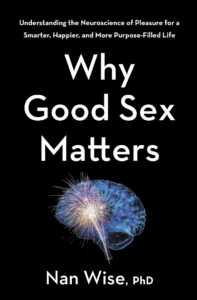Sex is everywhere – commercials, movies, even museums. After centuries of it being a topic to avoid, society have become more comfortable discussing and expressing sexuality than ever. It is surprising then that The Atlantic notes this generation is the first to be having less sex than the one that came before it. Is this a crisis? Nan Wise, neuroscientist, sex therapist and author of Why Good Sex Matters: Understanding the Neuroscience of Pleasure for a Smarter, Happier, and More Purpose-Filled Life, believes it could be and warns that the side effects may be far more reaching than they initially seem. She recently spoke to WellWell about the mental impact of sex, why it’s important and the specific challenges many face in fulfilling their pleasure.
You are a neuroscientist turned sex therapist. What was that journey like? What led you to this intersection between cognition and sex?
I come from a long line of people who have panic attacks and anxiety and I inherited that nervous system. So, I was always interested in the brain and how it influenced behavior. But after graduate school, when I started training as a sex therapist, I noticed there was a huge gap in literature on sex and its relationship to the brain. I realized there was very little to no writing on the basic functions of the brain regarding sex, even though sex and pleasure are some of the most powerful emotions the brain is capable of producing. That became the defining principal of much of my work.
You recently wrote in a column for Glamour that pleasure is not a luxury but a necessity for overall wellbeing. How does sexuality and sexual pleasure impact mental health in terms of depression and anxiety beyond just the health of your relationship?
Generally, when someone cannot gain pleasure from sex, it’s an indication that something may be out of balance in their emotional system. The inability to experience pleasure, which is called anhedonia, is often a symptom of anxiety, depression or stress. Therefore, the inability to get pleasure from everyday living is going to make us more depressed, more anxious, more stressed out–the connection between the pleasure signal and the emotional brain is an important part of maintaining mental balance. Our ability to experience sexual pleasure is great for the brain and helps us be able to experience pleasure outside of the bedroom, as well.
If lack of sexual pleasure is an indicator that you have some type of mental health issue such as depression or anxiety, how do we then combat the fact that one of the more common side effects of many antidepressants and anxiety medication is lack of sex drive?
That’s a great point and a lot of these medications can dampen sex drive, though they are obviously still very important. Certainly, being depressed or anxious isn’t good for a sex life anyway so it is a tricky situation. That’s why it’s so important to find the right medication for you, possibly one that’s less problematic for sexual functioning. That being said, when we prioritize pleasure in and out of the bedroom and it becomes practice, it’ll act as an anti-depressant in of itself. The more that we can focus on what I call the healthy pleasures (the things that feel good and are good for us), the better balanced our emotional brains are going to be.
There is evidence that the topic of sex in America is becoming less taboo. However, this generation is the first generation having less sex than their parent’s generation. This is all before the pandemic started, which I’m sure amplified it. Why do you think that while people are becoming more comfortable with sex, they’re having less of it?
I there’s two main reasons for it. Number one, there is so much distraction today. With the internet, smart phones and similar technology, people’s attention is constantly focused somewhere other than with the people closest to them or nearest them. At schools and universities now, I’ve noticed students no longer mingle before and after class, they sit on their phones. This limits their connection to others. The second is these devices are overstimulating us to the point they’re hijacking the dopamine system, limiting our desire to interact with other because we feel as though we have everything we need. All of this is tempering the rudimentary social skills people need to develop to socialize and forge real connections.
Do you think unrealistic expectations people might have for their sex lives that they’ve learned through this virtual world also plays a role?
Absolutely. There are so many men I’ve seen that have told me they learned about sex through porn. It’s so deleterious because the violation of our expectations can really be a source of emotion. It can cause disappointment and disillusion. But what they’re learning from porn is not how real sex is and its hijacked their dopamine system, their pleasure.
In addition to all of your research and writing, you are still an active sex therapist. Have you found with your any of your clients that the pandemic lock down has actually been a positive because they’re are forced to communicate with their partner? If for no other reason than they have nothing better to do.
Yeah, it’s been interesting. Early on during the lockdown, everyone was coming to me with anxiety and fear. But then, after a bit, they’d come in and say, “You know, I never dealt with this sexual issue and I feel like now it’s time.” Some also say, “We never dealt with this relationship issue and now we realize how important it is.” It’s forced a lot of people to reflect on and confront issues in their relationships and personally they may have been avoiding or ignoring.
What’s the biggest misconception people have towards sex?
That other people are having it. They think that everyone’s sex is better than theirs. It’s why I called the book Why Good Sex Matters rather than Why Great Sex Matters. We need to take the pressure off it. And it has nothing to do with age. That may be the biggest misconception of all. People think that sex is only for young people, especially regarding women. We think a woman reaches menopause, now she must enter sexual retirement. But that’s so not true. It’s all about how you feel personally. I think, the more comfortable you are in your own skin and the more you can connect with yourself and your partner, you can very good sex until the day you die. When we talk about lifelong sexual potential, it’s all about the connection with the partner. It’s not about the container.
 About Nan Wise, PhD
About Nan Wise, PhD
Nan Wise is a neuroscientist, certified sex therapist, board certified clinical hypnotherapist, and certified relationship specialist. She is the author of Why Good Sex Matters: Understanding the Neuroscience of Pleasure for a Smarter, Happier, and More Purpose-Filled Life.
Learn More at www.askdoctornan.com













